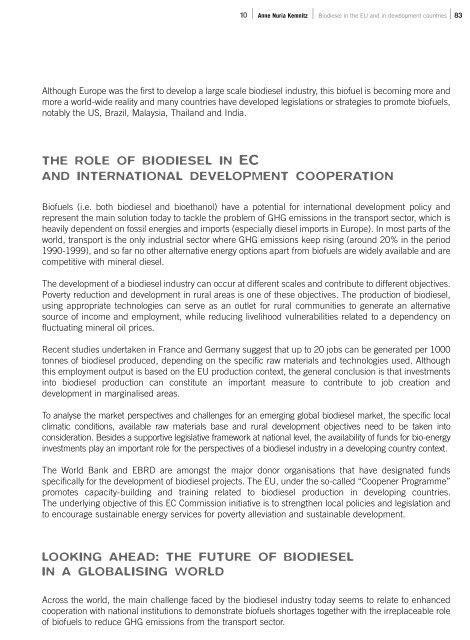Llibro_ISF_biodiesel
Llibro_ISF_biodiesel
Llibro_ISF_biodiesel
Create successful ePaper yourself
Turn your PDF publications into a flip-book with our unique Google optimized e-Paper software.
10 | Anne Nuria Kemnitz | Biodiesel in the EU and in development countries | 83<br />
Although Europe was the first to develop a large scale <strong>biodiesel</strong> industry, this biofuel is becoming more and<br />
more a world-wide reality and many countries have developed legislations or strategies to promote biofuels,<br />
notably the US, Brazil, Malaysia, Thailand and India.<br />
THE ROLE OF BIODIESEL IN EC<br />
AND INTERNATIONAL DEVELOPMENT COOPERATION<br />
Biofuels (i.e. both <strong>biodiesel</strong> and bioethanol) have a potential for international development policy and<br />
represent the main solution today to tackle the problem of GHG emissions in the transport sector, which is<br />
heavily dependent on fossil energies and imports (especially diesel imports in Europe). In most parts of the<br />
world, transport is the only industrial sector where GHG emissions keep rising (around 20% in the period<br />
1990-1999), and so far no other alternative energy options apart from biofuels are widely available and are<br />
competitive with mineral diesel.<br />
The development of a <strong>biodiesel</strong> industry can occur at different scales and contribute to different objectives.<br />
Poverty reduction and development in rural areas is one of these objectives. The production of <strong>biodiesel</strong>,<br />
using appropriate technologies can serve as an outlet for rural communities to generate an alternative<br />
source of income and employment, while reducing livelihood vulnerabilities related to a dependency on<br />
fluctuating mineral oil prices.<br />
Recent studies undertaken in France and Germany suggest that up to 20 jobs can be generated per 1000<br />
tonnes of <strong>biodiesel</strong> produced, depending on the specific raw materials and technologies used. Although<br />
this employment output is based on the EU production context, the general conclusion is that investments<br />
into <strong>biodiesel</strong> production can constitute an important measure to contribute to job creation and<br />
development in marginalised areas.<br />
To analyse the market perspectives and challenges for an emerging global <strong>biodiesel</strong> market, the specific local<br />
climatic conditions, available raw materials base and rural development objectives need to be taken into<br />
consideration. Besides a supportive legislative framework at national level, the availability of funds for bio-energy<br />
investments play an important role for the perspectives of a <strong>biodiesel</strong> industry in a developing country context.<br />
The World Bank and EBRD are amongst the major donor organisations that have designated funds<br />
specifically for the development of <strong>biodiesel</strong> projects. The EU, under the so-called “Coopener Programme”<br />
promotes capacity-building and training related to <strong>biodiesel</strong> production in developing countries.<br />
The underlying objective of this EC Commission initiative is to strengthen local policies and legislation and<br />
to encourage sustainable energy services for poverty alleviation and sustainable development.<br />
LOOKING AHEAD: THE FUTURE OF BIODIESEL<br />
IN A GLOBALISING WORLD<br />
Across the world, the main challenge faced by the <strong>biodiesel</strong> industry today seems to relate to enhanced<br />
cooperation with national institutions to demonstrate biofuels shortages together with the irreplaceable role<br />
of biofuels to reduce GHG emissions from the transport sector.


